Rúben Amorim’s arrival at Manchester United as head coach symbolizes a new chapter for a club steeped in rich history but currently grappling with challenges on and off the pitch. Appointed on a two-and-a-half-year contract, Amorim is handed the daunting task of revitalizing a squad languishing in the mid-table of the Premier League. Unlike previous regimes, the emphasis here is not on a flurry of new signings but rather on maximizing the potential of the current roster. With Manchester United sitting 13th in the standings, the pressure for immediate improvement is palpable.
Given the club’s financial constraints, speculations of a significant transfer budget in January appear highly unrealistic. Instead, Amorim is invited to delve deep into his inherited squad, extracting hidden talents and reshaping their play into a coherent and competitive unit. The challenge is multifaceted: addressing tactical inefficiencies while navigating the expectations of a passionate fanbase clamoring for thrilling performances and positive results.
A Shift in Tactical Approach
One of Amorim’s primary strategies involves the introduction of a 3-4-3 formation, a system that yielded great success during his tenure at Sporting CP. This system emphasizes flexibility and encourages attacking play, which could potentially reignite the attacking flair that many believe is missing from the current United setup. The successful execution of this tactical shift hinges significantly on player adaptability and the willingness to embrace a new philosophy.
In his first training session at Carrington, Amorim focused on integrating key players like Marcus Rashford and Casemiro, who are crucial to implementing his vision. It will be essential for these senior figures to foster an environment of collaboration and resilience, as they assume leadership roles within the squad. Amorim’s ability to connect with the players and convey his vision will be pivotal in an era where adaptability is essential.
Looking Ahead: The Path Forward for Manchester United
As Amorim prepares for his inaugural match against Ipswich Town, the stakes could not be higher. He inherits a squad that has perhaps been overhauled too aggressively in previous years, yet he must also contend with the ghosts of past transfer dealings, which have not yielded the expected dividends. Under the previous management of Erik ten Hag, the club invested over £600 million, acquiring a total of 15 players—yet the results on the pitch remained inconsistent.
Now, with Dan Ashworth and Jason Wilcox steering the recruitment strategy, Amorim’s influence in the transfer market may come into play during the next summer window. However, the strategic focus will remain on enhancing the existing squad rather than embarking on a full-scale overhaul. This conservative approach could serve to foster stability and continuity, allowing a clearer footballing identity to develop over time.
Rúben Amorim’s arrival at Manchester United is more than just a new head coach; it represents a philosophical shift towards nurturing talent from within rather than constantly searching for external solutions. Success in this challenging landscape will depend on leveraging existing assets and implementing a coherent strategy that aligns with the club’s ambitions. Only time will reveal whether Amorim can indeed breathe new life into the iconic football club.

